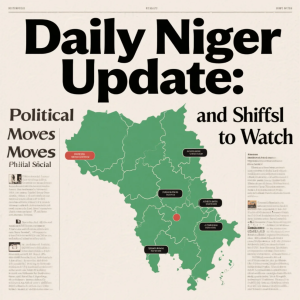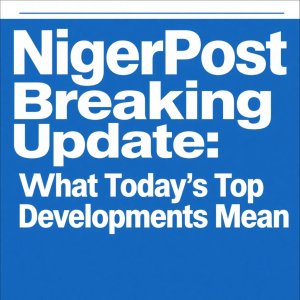Niger stands at a defining moment in its development journey.
After years of navigating economic challenges, the nation is now focused on strengthening resilience and fostering sustainable growth.
Efforts to diversify beyond traditional sectors like agriculture and mining show promise, especially as Niger embraces digital innovation and renewable energy.
Investment in infrastructure, education, and small enterprises remains essential to achieving long-term economic stability.
⚡ 2. Energy and Resource Transformation
As the world shifts toward cleaner energy, Niger’s rich resources could redefine its future.
Solar energy projects, particularly in the Sahel region, highlight the country’s commitment to green development.
While uranium exports continue to play a role, the focus is shifting toward self-sufficiency and sustainable power generation to support both rural and urban communities.
This transformation not only strengthens Niger’s energy independence but also aligns it with global climate goals.
🧠 3. Education, Innovation, and Youth Empowerment
With more than half its population under 25, Niger’s youth hold the key to its progress.
Education and skill development are top priorities for building a modern workforce ready for regional and global markets.
Initiatives promoting entrepreneurship, digital literacy, and vocational training are helping young Nigeriens become active participants in their country’s growth story.
Empowering youth ensures that Niger’s future will be both dynamic and inclusive.
🌾 4. Agriculture and Food Security in a Changing Climate
Agriculture remains the backbone of Niger’s economy.
However, changing weather patterns and desertification challenge productivity and food security.
To combat these issues, local and international partners are investing in climate-smart agriculture, irrigation technology, and drought-resistant crops.
Such strategies are helping farmers sustain livelihoods while protecting the environment — a critical balance for Niger’s long-term stability.
🌐 5. Regional Cooperation and Global Partnerships
Niger’s success is deeply tied to regional stability and cooperation.
Partnerships within ECOWAS and the African Continental Free Trade Area (AfCFTA) open doors for trade, investment, and shared security initiatives.
Meanwhile, collaboration with global organizations supports infrastructure, governance, and humanitarian efforts.
These alliances ensure that Niger remains connected to the global economy while preserving its sovereignty and cultural identity.
🕊️ 6. Security and Governance: Foundations for Growth
Sustainable progress depends on peace and good governance.
Efforts to improve transparency, strengthen institutions, and promote local leadership continue to shape Niger’s governance landscape.
By focusing on inclusive decision-making and community engagement, the country is working toward long-term stability — an essential condition for attracting investment and nurturing innovation.
🌅 Conclusion: A Future Built on Hope and Determination
Niger’s future will be defined by its ability to adapt, innovate, and unite.
From renewable energy to education reform, each initiative contributes to a broader vision of self-reliance and sustainable prosperity.
Despite challenges, Niger’s people remain its greatest strength — resilient, resourceful, and ready to shape their next chapter with purpose.
Niger’s economic future is no longer just a vision — it’s a movement in progress.




